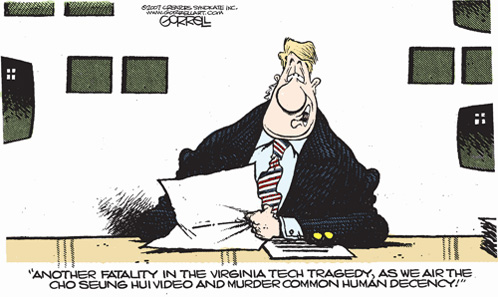Public Opinion is formed in America in the disparate experiences of the masses that the major media then forms and congeals into an entity that can be measured and exploited via advertising.
The Editorial Cartoon, however, has always found its most purposeful purchase just outside that mainstream media venom line to pock and poke fun of falsely considered mainstream media values with sticks of truth and the bones of what is real.
One cannot escape the reality that this week’s Semiotic Scathing is
colored by three distinct matters: How the deaths at Virginia Tech and
the killing in Iraq are sadly similar; how NBC’s wrongful decision to air the murder’s rantings damages us all and, finally, how Guns in America frighten and distance us from each other.
VIRGINIA TECH Vs. IRAQ WAR



NBC’S WRONGFUL AIRING



GUNS IN AMERICA





Why do these Editorial Cartoons speak so strongly to us?
Do they convey the reality of our darkest fears?
Or do they confirm the truth of what we already know?
I say these cartoons remind us of the truth we’ve forgotten. They’re little nudges to remember what should matter to us.
Anne —
I wonder why we forget the truth so easily?
We forget because our minds are played with by those who want to push us away from the truth.
In light of the news of the week it’s interesting to me how much attention and protection is given to the unborn while those children who are alive and thriving don’t get the same rabid, caustic, protection from harm.
Yeah that and how people who demand the right to hanguns also demand a baby’s life is more important than the mother’s.
Ooo! Interesting connection, Anne!
I’m just so surprised how a little cartoon can say so much. That’s lots of talent, huh?
It sure does, arin. To semiotically say in a single image what takes the rest of us to say in 1,000 words is, indeed, a great talent.
I guess that’s why they’re so powerful. They say everything in one frame.
I think the most successful use of the Editorial Cartoon was during the Watergate era, arin. Every single day all day Nixon provided so many opportunities for mocking and truth-telling via cartoon. They drove him from office.
I can imagine that being the truth. You can’t really argue with a cartoon.
Right! The cartoons cut your up while revealing the truth. They are certainly an effective editorial tool for calling in the truth.
I think they get to the point very directly – they cut to the chase and they voice some of the uncomfortable truths which others dare not.
Yes, Nicola! They are very direct and blunt. I agree that is the power of the image in providing a societal correction.
I think these comics are re assurance that there is true, sane, educated media; some one else who wants to communicate an opinion, who thinks that tragedy’s are simply over proportioned. We know about the many dead in Iraq, we get told EVERY day, but we ceize to be affected by something so foreign. Is it a cultural issue? We surely have the ability to learn of the ridiculously violent tragedies of other countries, and even moreso the ability to communicate them, but we regard our personal safety above that of all human’s right to survive. Or do we simply think that because we are at war, they are the enemy, and have forfeited their rights to our personal concern?
You ask many important questions, Mathieu, and I don’t know all the answers.
My guess is that your instinct is correct — Iraq is foreign and distant and VA Tech is the here and immediate now.
If the deaths had been switched — if we were fighting Iraq here and the school deaths happened in another country — we’d certainly be fussing over the Iraqis among us and not a lone madman elsewhere.
That duplicity in perspective and diplomacy is what is eating us alive in the administration of our current foreign policy.